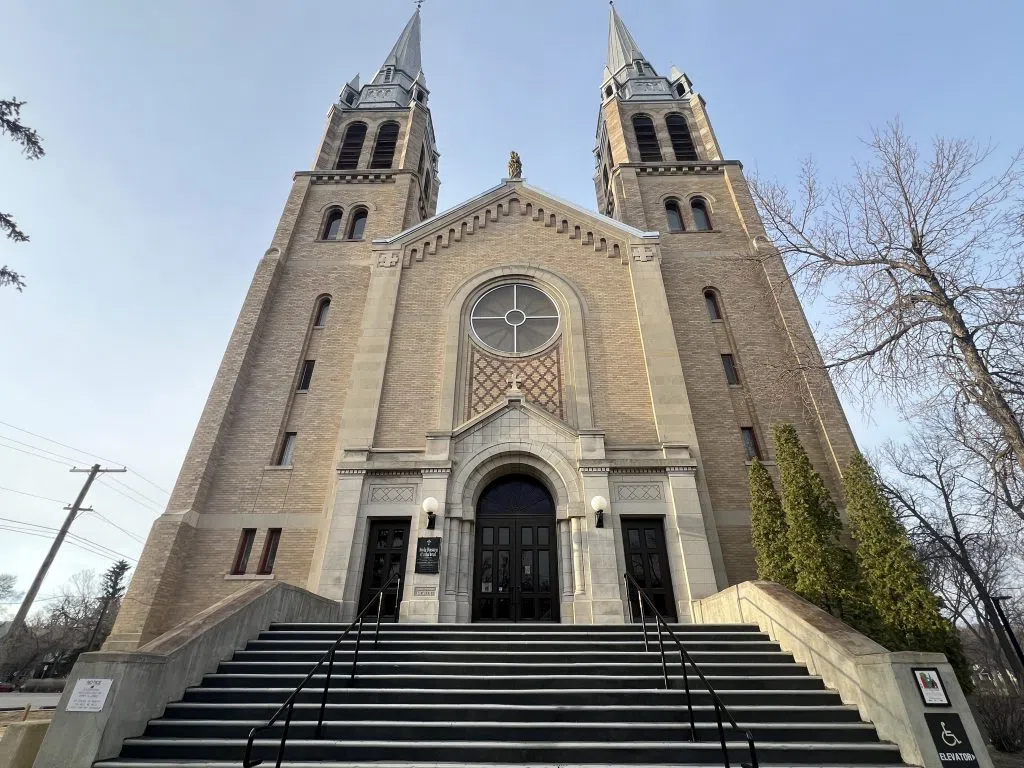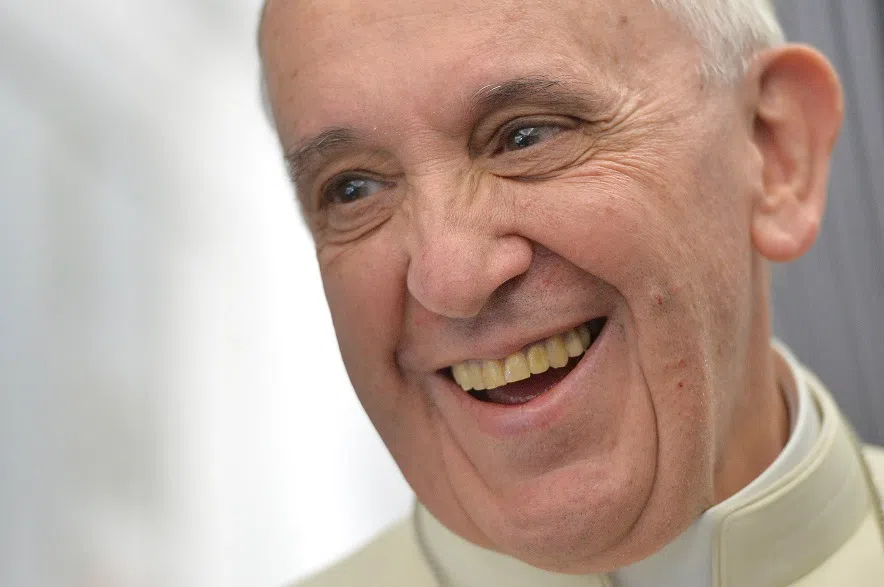Catholics in Saskatchewan and around the world are in mourning following the death of Pope Francis.
The pope died on Monday at the age of 88, following a hospitalization for pneumonia earlier this year. But despite his recent health challenges, Francis made a public appearance – his last – at the Vatican on Easter Sunday.
According to the Holy See’s Dicastery for Communication, Francis died of a stroke, “followed by a coma and irreversible cardiocirculatory collapse.”
Read More:
- ‘Humility, compassion and care for others’: How Canadians are remembering Pope Francis
- Canadians remember Pope Francis for historic apology for residential schools
- Advance polls open for last day as election campaign heads into final week
Francis, born Jorge Mario Bergoglio in Buenos Aires in 1936, was elected as head of the Catholic Church in 2013 after the resignation of Pope Benedict XVI, making him the first pontiff from the Americas and the first Jesuit pope.
Donald Bolen, the archbishop of Regina, joined the Evan Bray Show on Monday morning to share his thoughts on Francis’ passing and the legacy the pope leaves behind.
Listen to the full interview with Bolen:
“It’s a day of sadness, but also a day of gratitude to think about all he’s accomplished in the past 12 years,” the archbishop said.
“He didn’t change anything in terms of church doctrine, but he did change the way that popes live and act in many ways, and he felt the freedom to do that because his deepest faithfulness was to God, not to the way things had always been done.”
Francis, Bolen explained, was always deeply committed to dialogue with other Christian and religious communities, as well as with Catholics, and he worked to improve the church’s unity by involving more people in major decisions.
“His instinct wasn’t that he was pope and he had the answers to every question. His instinct was ‘Let’s talk about this. Let’s involve the community in this discussion. Let’s listen to those who are on the margin, and then let’s figure out together what God is asking,’” Bolen said.
Francis’ most recent visit to Canada came in 2022, when he offered an apology for the church’s role in the residential school system, which saw many Indigenous children taken from their families and subjected to abuse. Bolen said he accompanied Francis during every step of the trip.
“I think for many Indigenous people, the visit was transformative,” Bolen explained.
“The apology opened the door to a question about how does the church, and society at large, walk with Indigenous people?”
While he acknowledged that there were a wide range of reactions to Francis’ apology, Bolen said the church – as exemplified by Francis – is working hard to recover and repair its “wounded” relationship with Indigenous peoples.
Bolen said Francis “went out on his own terms” after disobeying the instructions of his doctors and insisting on making a public appearance on Easter.
The pope’s legacy will include his emphasis on God’s universal mercy, Bolen said, as well as his policy of involving many people in his important decisions.
“The Catholic Church has never intended that the pope makes decisions in an isolated way, but Pope Francis has just really pushed for this consultative structure,” Bolen said.
“He’s been just a great pope, from my perspective.”

Bernadette Kutarna goes to Holy Rosary Cathedral in Regina, and said she is sad Pope Francis died, but also said he left behind a wonderful legacy. (Abby Zieverink/980 CJME)
Regina woman reflects on Pope Francis’ legacy
Bernadette Kutarna said it was sad Pope Francis died, as she attends the Holy Rosary Cathedral in Regina.
“I am very sorry that he died. One would expect that of an 88-year-old person who is part of our lives, but I know he is going to be sorely missed.”
However, Kutarna said it also allowed her to reflect on his legacy.
“I’ve been thinking about him recently because he has been very ill. When I got the message that he had died, I immediately went to look at some news reports about his legacy,” she said. “It was a good reminder of his legacy.”
“Pope Francis did some wonderful, wonderful, wonderful things in the Catholic Church and I know that some of the things he did had some controversy. So, that’s the mixture of a very good man.”
Kutarna said that she is not sure what she is hoping to see with the new pope that is selected, but she said it will be interesting.
“I’m curious. Pope Francis was from a very different part of the world than historically, popes have come from, so I don’t know what will happen. I know that the Cardinals will travel to Rome for the Conclave,” she said. “I am waiting with curiosity, as every Catholic is at this time.”
Saskatoon bishop says Francis ‘loved to be with the people’
Mark Hagemoen, bishop of the Diocese of Saskatoon, described the cloudy weather in the Bridge City on Monday as fitting.
“We had a beautiful, sunny, warm Easter,” he said.
“I was surprised to wake up to how dark and gloomy and wet it was, then all of a sudden I heard the news of the pope’s passing, so the pope who loved and blessed creation… maybe is affirming his passing today.”
Hagemoen said the news of Francis’ death came as a bit of a surprise. After battling health issues and being hospitalized earlier in the year, he said the pope seemed to be on the mend.
“I was shocked, because he had recovered and rallied seemingly well,” he said. “I think I – and many others – are still really surprised.”
Hagemoen said he was able to meet with Francis in 2014 and again in 2015. He said the pope’s heart and mind stood out to him during their meetings.
“We discussed with him, as bishops, a number of difficult issues,” Hagemoen said.
“There was no question that he would not take, and he would analyze it with great intellectual capacity. He would pull apart the nuance of many issues, and he had no problem getting into difficult pastoral issues, and he did so in a very engaging, analytical manner.”
Francis has been called a “pope of the people,” and Hagemoen said that’s the perfect way to describe him.
“He loved to be with the people. He loved to be a pope and a religious leader for the people, with the people,” he said. “The greatest example of how he was a pope for others was the apostolic visit to Canada in 2022.”
Even as his health declined, Hagemoen said Francis loved to engage with everyone he met.
“He came alive when he engaged with people directly from his wheelchair, whether they were children or babies of families or whether they were some of the various leaders from the different Indigenous delegations,” the bishop said.
The process towards choosing the next pope is expected to get underway soon, and Hagemoen said it’s very straightforward.
“The conclave of cardinals is called together, and they enter into what is a sacred and prayerful process,” he explained. “They call on the Holy Spirit to prayerfully guide their deliberations and discernment. There is a considerable time of quiet prayer in the process.”
The conclave of cardinals will then move into a process of voting until one of the candidates receives at least two thirds of the vote and is appointed pope.
–with files from 980 CJME’s Abby Zieverink and the Canadian Press











